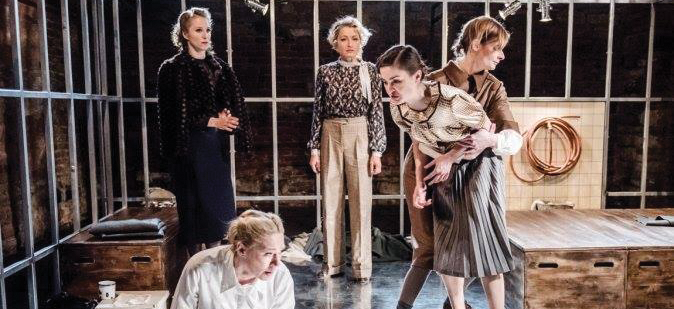
“Pankrác 45” boldly provokes introspection on the nature of culpability and the effectiveness of retribution. Set in the Czech Republic after the Holocaust, the production trains an unflinching eye on the fates of four women associated with the Nazi regime as the community struggles with the aftermath of the atrocities.
The Svanda Theater is one of the oldest and best-known theater companies in Prague, Czech Republic. For over a year, the theater has been working on an ambitious project — a weeklong residence in Washington, D.C., to showcase four of their shows at Georgetown’s Davis Performing Arts Center. The residence is part of the Center’s 2018-2019 program season, “Friends Far and Near,” which aims to promote partnerships and co-productions with other Georgetown theater groups and foreign embassies, bringing diverse perspectives and topics to local audiences.
With collaborations and support from the Embassy of the Czech Republic in D.C. and Georgetown’s Laboratory of Global Performance and Politics, this partnership brought Svanda’s best shows to stage, culminating with the English-language world premiere of “Pankrác 45” by Martina Kinská.
All these productions showcased at the Davis Performing Arts Center reference the events of the Holocaust and its effects on Bohemia and the rest of the world. They attempt to give proper honor and understanding to these events, to convey the conflict and despair and, hopefully, to help people inch closer to finding closure and perhaps even peace vis-a-vis such terrible events.
“Pankrác 45” is based on the lives of five women who were incarcerated after the end of World War II amid a major effort to cleanse all memory of the Nazi regime and heal the wounds it left in Czechoslovakia.
Delivered completely from the perspective of a small, shared prison cell, “Pankrác 45” shares their stories — their different reasons for being accused of sympathizing with or supporting the regime in Prague and their own struggle and guilt.
Two of these women were famous actresses who had participated in films and performances associated with the German regime. Another was a member of the Czech resistance accused of spying for the Germans. A fourth, largely mysterious, shares little of her dealings or why she is in prison. Later, they are joined by a final woman, who eventually admits to being the wife of Karl Frank, an infamous general remembered for his disdain of Czechs.
As the Czech people clamor for justice and look for culprits, these women are thrust into a debate about responsibility, agency and blame. People might never forgive or forget the atrocities committed by the regime, but there is something to be said about the struggle to survive and the extent to which people can go in overcoming adversity.
Through conversations between the cell’s residents, streams of thought that spill onto the stage and sets of narration that break from the timeline and setting, a powerful story is woven.
Strong writing, passionate acting and powerful history push the audience to explore the themes of truth, remembrance and restoration.
As the women open up and share their stories, themes of adultery, treason, substance use and physical abuse flair up in their conversation, reflecting the spirit of a flawed humanity. Love, ignorance, fear and misunderstanding are all cited as reasons for indulging the regime.
The characters clearly do not condone the horrific events, and regret their involvement, if any, or lack of opposition, yet there seems to have been little room for different choices. Are they as responsible as those who established the regime and perpetrated the violence? Surely not. But can these women be punished, and if so to what extent? The audience is faced with this dilemma again and again as the women inch closer to their verdicts.
The tension and claustrophobia of the tiny prison cell are effectively broken up through a series of pauses and interjections that bring in different perspectives to the story. News announcements are shown on screens or read by the characters and flashbacks are narrated. A few short monologues reveal the deepest thoughts of the protagonists, adding even greater context and emotion to the story.
At one point halfway through the show, one of the women starts to remember how, little by little, she lost her liberties as the war went on. A Bohemian Jew, she lists the months and years when she was deprived of the freedoms to walk in the streets, to dress as she chose and to participate in public life.
This shocking intermission makes viewers reflect on banishment and shunning. Another break is used to describe the sentiments of the public through a news release, which explains that the people of Czechoslovakia are to be the jurors of this brutal cleansing. They will be given power to decide who deserves punishment.
This powerful moment shows the darkest manifestations of human behavior, as people pursue each other, trying to hunt down those who wronged them. At this crucial point, it is unclear if the power to hunt down perceived perpetrators will allow victims to achieve closure. At what point will justice be served?
In the end, viewers are left with more questions than answers. All these women pay a price, sleepwalking through what seems to be the rest of their lives. The people of Bohemia remain broken, and the crimes of the war are not easily forgiven.
As the lights came down on the final scene of the show, most viewers remained stuck to their seats, feeling taken aback and conflicted. While the artists bowed, members of the audience applauded their performances, their ability to bring life back to such a powerful tragedy and to the desperate attempts to obtain justice and closure that followed. Was the fate of these women true justice? Are there other, better ways to overcome this tragedy? These questions remained unanswered. Thankfully, Svenda had the courage to ask them.



















